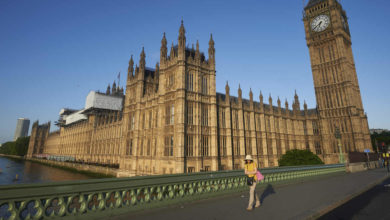Kemp Wins the Georgia Governor’s Race

ATLANTA — Gov. Brian Kemp of Georgia easily dispatched with Donald Trump’s hand-picked challenger on Tuesday in a Republican primary that demonstrated the limits of the former president and his conspiracy-fueled politics in a critical swing state.
Kemp will face Democrat Stacey Abrams this fall in what will be one of the nation’s most consequential governor’s races.
Trump was rebuked in the results, which were an abrasive rebuke for a race he valued above all others. Angered by Kemp’s refusal to go along with his extraordinary effort to overturn the 2020 election results in Georgia, Trump personally recruited former Sen. David Perdue to launch a primary. Trump also encouraged another Republican to quit the race, in an effort to open the way to Perdue winning.
Kemp was ultimately a formidable candidate, able draw prolific fundraising figures that allowed him to flood Georgia with TV and other advertisements. In the closing days of the campaign, Kemp utilized the power of his office and unveiled the $5.5 Billion, 8100-job Hyundai Motor plant in Savannah.
In defeat, Perdue struck a unifying tone that has become increasingly rare in a Republican Party dominated by Trump’s hardline tactics.
“I want you to know tonight that I am fully supporting Brian Kemp in his run to beat Stacey Abrams,” Perdue said. “It’s emotional for all of us, we’re disappointed, I get that. Let’s take a few hours, lick our wounds, and tomorrow morning, you’re going to hear me going to work for Brian Kemp to make damn sure that Stacey Abrams is never governor of Georgia.”
On Tuesday, voting was held in five states, which included Alabama, Arkansas Texas, Minnesota, and Texas. Trump’s lie about the theft of 2020 and Georgia being more infected than any other state has been more destructive.
Perdue’s loss becomes the latest example of a primary setback for Trump’s preferred candidates, who have lost governor’s races in Idaho and Nebraska. The Pennsylvania Senate primary will be decided in the next week.
Still, the totality of Tuesday’s contests underscored the sustained power of Trumpism in Republican politics 18 months after he was voted out of office. His preferred Senate candidate in Georgia, Herschel Walker, easily won the GOP nomination despite warnings from Walker’s Republican competitors about his history of domestic violence and mental health struggles. The Democratic incumbent senator Raphael Warnock will challenge him in the fall. This race could be decisive in maintaining control of this chamber.
Georgia Secretary of State Brad Raffensberger, who refused to support the former president’s direct calls to overturn the 2020 election, was in a fight to avoid what could be a challenging runoff election. Raffensperger is up against three main challengers. Trump-backed Rep. Jody Hice. The winner will serve as Georgia’s chief election officer in the 2024 presidential election.
And former Trump White House press secretary Sarah Sanders, who was the face of an administration that contributed to the nation’s stark divide, won the Republican governor’s nomination in Arkansas.
Regardless of Trump’s involvement in their races, virtually all of the Republican candidates — even Kemp — ran on “election integrity.” That phrase that has emerged as a code for the former president’s baseless grievances about the 2020 election, which were roundly rejected by courts and his own attorney general. Conservative candidates from Georgia to Arkansas to Texas also leaned into Trump’s preferred culture wars by playing up concerns about transgender athletes, “critical race theory” and illegal immigration.
Sensing Kemp’s strength in Georgia, however, other prominent Republicans had grown increasingly willing to defy the former president.
Trump’s own vice president, Mike Pence, rallied with Kemp in the Atlanta suburbs on Monday evening.
“Elections are about the future,” he told the crowd, adding that “when you vote for Brian Kemp tomorrow, you will say yes to a future of freedom here in Georgia. You will say yes to our most cherished values at the heart of everything we hold dear.”
Republicans and Democrats in other parts of the country were also grappling with strategic and ideological divisions which will decide who to nominate for each candidate and prioritize issues for the general election.
Democrats were particularly focused on the south Texas runoff election, in which Rep. Henry Cuellar (the long-serving incumbent) was being challenged by Jessica Cisneros, a progressive in a race in which abortion was an issue. Cuellar, the House’s only anti-abortion Democrat, is retiring.
Republicans were choosing a set of primaries with some of the most controversial Republicans.
Alabama conservative firebrand Rep. Mo Brooks had been running for the GOP to replace Sen. Richard Shelby. Brooks, a leading figure at the Jan. 6 “Stop the Steal” rally that preceded the Capitol attack, initially won Trump’s endorsement, although Trump rescinded it after watching Brooks struggle in the polls.
Leading Trump ally Rep. Marjorie Taylor Greene won her primary election in the state’s 14th congressional district, despite a first term notable for her conspiracy theories and controversy.
On the Democratic side in Georgia, two congressional incumbents, Reps. Lucy McBath and Carolyn Bourdeaux, were running against each other in suburban Atlanta, forced into a rare incumbent-on-incumbent primary after Republicans redrew the congressional map.
Tuesday marked the first Georgia election under a new voting law adopted by the Republican-backed state legislature in response to Trump’s grievances. It was made harder for voters to cast their ballots by mail. The change, popular among Democrats during the 2020 pandemic, introduced new voter ID requirements which critics warned could disenfranchise Black voters. And it expanded early voting in rural areas where most people vote Republican.
A new law prohibits the distribution of food and water within 150 yards of polling stations. This practice is common in cities with lengthy voter lines.
Georgia did not experience any system-wide or major problems despite concerns over the law’s impact. There were occasional reports that polling stations opened late or had minor problems with equipment, and voters found themselves in the wrong place.
Early voting totals in Georgia suggested enormous voter interest — especially on the Republican side.
The secretary of state reported that 857,401 early voters cast ballots through Friday. 795,567 voted in-person. There were 483,149 votes cast for Republicans, and 368.949 for Democrats.
These figures reduced early voting participation in 2020’s presidential election. In total, 254,883 Georgians voted earlier.
In the Atlanta suburb of Woodstock, 42-year-old land surveyor Nathan Johnston said he was voting for Kemp because of his leadership during “a tough four years.”
“We didn’t stay shut down any longer than we had to and worked our way through the pandemic, and the economy is doing pretty good, so I think that reflects well on him,” he said.
—Washington, DC – Peoples. This report was contributed by Jeff Martin, an Associated Press journalist from Woodstock, Georgia.
Read More From Time





